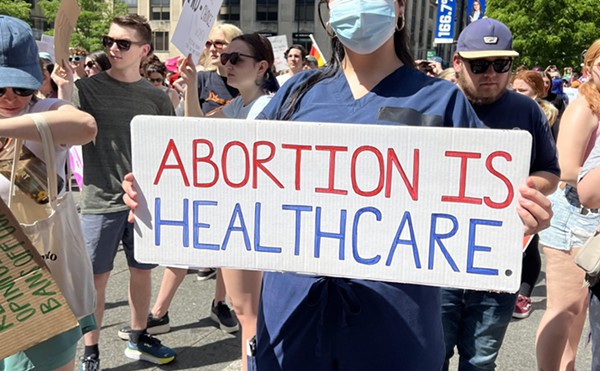|
A bill in the Ohio House of Representatives would set significant new requirements for law enforcement and businesses, with a mind to making it more difficult for undocumented immigrants to live and work in the state.
The bill, proposed by State Rep. Courtney Combs (R-Hamilton), is so new that it hasn't yet been assigned a legislative number. But advocates for immigrants are already criticizing the bill, saying it will feed a growing animosity to newcomers, encourage racial profiling and create cumbersome requirements for business and law enforcement.
The bill would make it a felony to knowingly transport or "conceal" an undocumented immigrant and would regulate the issuing of government ID cards. Other provisions include:
· a requirement for businesses that have state contracts to verify the immigration status of job applicants;
· a requirement for law enforcement and prisons to verify the immigration status of those who are arrested; and
· a presumption that undocumented immigrants are flight risks and should be denied bond.
'Immigration augments'
Immigrants are spurring economic growth, feeding money into the Social Security system — soon to be stressed by retiring baby boomers — and expanding the diversity of our culture with the heritage of music, food and art of their upbringing.
But Comb's bill refers to immigrants as aliens — an 18th century term for foreigners — who must be stopped.
"People are thinking, 'Look how many millions of illegal immigrants! We've got to do something about this,' " says Maria Zayas-Davis, a Cincinnati immigration attorney.
Parts of the bill duplicate existing regulations by requiring "public agencies to verify the individuals who apply for certain public benefits are United States citizens or qualified aliens."
It also forbids employers from firing an employee with legal status in order to hire one without it.
"Parts of (this bill) are redundant and perpetuating misperceptions about immigrants," Zayas-Davis said. "The bill talks about people who don't have immigration status not having access to public programs, housing, welfare and food stamps. (Immigrants) fear even thinking about even going to these programs because, if they don't have immigration status, then they're concerned that they're going to be deported. It's not like immigrants sit around master-planning how they're going to get these benefits. The message behind that legislation is that immigrants are taking, taking, taking from the system when it's not even happening."
Far from threatening Ohio's prosperity, immigrants are essential to attracting and retaining residents and businesses, according to George Vredeveld, director of the Economics Center for Education and Research at the University of Cincinnati.
He counts himself among the "vast majority" of economists who have shown time and again that economic growth is directly linked to open immigration policies. He invokes the basic laws of supply and demand: More people want more things. For more things to be available, more people must be employed to make those things.
The difficult part for many people is thinking beyond the next paycheck and the immediate issues faced by relatives and friends.
"Immigration augments your labor supply," Vredeveld says. "In this case, you have to look at the short run and the long run, and you have to talk about 'in general' compared to specific cases. You're always going to find some cases where an American is displaced by an immigrant. You'll be able to find many of them. However, if you look at it just a little more broadly, a larger labor supply spurs economic growth. Economic growth spurs increased demand for labor. In the longer term, it's going to generate jobs, not only for immigrants but for Americans, too."
On the hunt
The bill virtually ensures that racial discrimination will become part of police and business practice, according to Zayas-Davis.
"It's giving a way to legalize racial profiling," she says. "We encourage you to ask about immigration status — the more often, the better. We want employers to ask. We want law enforcement officials to ask. We want everybody to ask. We can't legislate for everybody to ask, but we'll legislate for those people we can."
Having police check immigration status could create an impediment for people who have been victims of crime, making them afraid to call police.
"Police intervention results in an inquiry of your immigration status," Zayas-Davis says. "If you're a victim, what's the chance that you will report the crime if you don't have immigration status? What's the likelihood prosecutors are going to get the victims of domestic violence to show up in court after the passing of that bill?"
The legislation would require state employees and contractors to look for undocumented workers — the most obvious being those with non-white skin or an apparent foreign accent.
The bill would require verification of legal status through a U.S. Department of Homeland Security "basic pilot program." As the word "pilot" implies, the system is still in the process of being implemented, and all of the bugs haven't been worked out. The verification system already has proven flaws that will limit its effectiveness.
"Immigration (enforcement) itself makes a mistake where someone is eligible for work authorization, and they don't update the records on a timely basis," Zayas-Davis says. "When I say a timely basis, I'm not talking about they wait a day or two. I've had clients where it's taken a month to remedy this. In the meantime they can't work, even though they're eligible to work, because the computers say they can't work. I've had that happen to people who applied to a company that was part of the pilot program."
Rep. Combs didn't respond to repeated requests for an interview. ©





